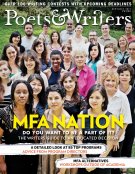ONLINE-ONLY REVIEWS
Hundreds of
online-only book-related websites—Barnes
& Noble Review, Bookslut, the Complete Review, the Millions, the Morning News, the Quarterly Conversation, and the Rumpus, to name a handful—are increasing reader traffic
as well as the number of books being covered. A much-watched newcomer to the
mix, launched in April, is the nonprofit Los
Angeles Review of Books, edited by
Tom Lutz, with a focus on long-form reviews with a West Coast perspective from
contributors including Jane Smiley, Greil Marcus, and David Shields. “The Los Angeles Review of Books was born as we watched the Sunday book-review
sections of paper after paper die at the same time that the number of new
titles continued to explode,” says Lutz. “We are building a site designed to
offer numerous linking opportunities on each page, trying to resist what we see
as the main scourge of current web knowledge: The web constructs a word-search
interface, which is very good at helping people find the things they know they
want to know, but less good at the serendipitous learning that happens in
open-stack libraries or superbly curated bookstores. Much of the value we hope
to add will be the way we link throughout the site and to pieces elsewhere. We
want readers to enjoy a continuous process of discovery as they navigate.”
Salon and Slate, founded in 1995 and 1996, respectively, are the old-timers of online book coverage. Slate reviews half a dozen books a month. Salon senior editor and cofounder Laura Miller writes weekly book reviews, 75 percent of which are of nonfiction works. “On one side, this is a sad decline from the heyday when Salon had a book section that ran a review every day plus features and news,” Miller says. “On the other, we still have a staff writer dedicated pretty much exclusively to writing about books (me), which is more than a lot of newspapers can say these days.”
The Millions, which publishes three or four reviews each week, started out in 2003 as a personal writing project for editor C. Max Magee and has evolved into a book-oriented website with a staff of a dozen writers and dozens of guest writers. “We reach more than a million people a year,” Magee says. “We’ve been lucky to get links from our fellow online magazines in the culture space, like the Daily Beast. We’ll cover anything that piques our interest, from the very mainstream to the very obscure.”
Another online-only staple is Inside Higher Ed (IHE), launched as a daily in January 2005 and now attracting more than seven hundred thousand distinct visitors each month, most of them in academe. “Although everyone involved in IHE at the start had extensive newspaper experience—or perhaps because they had that experience and could read the writing on the wall—it has always been online, and it has always been free,” says Scott McLemee. As intellectual-affairs columnist, McLemee focuses largely, but not exclusively, on university-press titles. “I still think of it in the same terms as I did before ever going online,” he said. “It’s a matter of thinking out loud about books—assessing them, but also mulling over their contexts and implications, my own long-term preoccupations, or whatever else seems to apply.”
Blake Butler, editor of HTML Giant, the literature blog launched in 2008, ticks off the advantages of the online-only approach: “low cost, wide readership, easy access, integration of diverse media, timely response, messy fun, weird troll trouble, party city.” HTML Giant runs four to ten reviews a month, with an emphasis on small press books, and Butler’s approach to books is informal: “I like a big wild mess where there is more focus on talking about things as if we’re talking to our friends than sitting in an office getting paid to talk about books,” he says. “We try to be a little more real and a little more rowdy, in the name of unserious seriousness, where the stakes are as high as you let them be and the door is open.”
Tina Brown’s the Daily Beast introduced a book section, Book Beast, in February 2009, which was a finalist for a 2011 Digital National Magazine Award. Lucas Wittmann, the Daily Beast’s books editor, says he covers (by review, interview, author essay, and/or video) ten to fifteen titles a week. “I love what the small presses are publishing and always pay attention,” he says. The recent merger of Newsweek and the Daily Beast added a print publication and an expanded web audience to the Book Beast portfolio.










Comments
xstewart replied on Permalink
Washington Independent Review of Books
Ms. Ciabattari's welcome survey missed www.washingtonindependentreviewofbooks.com, which has been posting multiple reviews and feature articles about the world of books since February -- check it out!
David O. Stewart